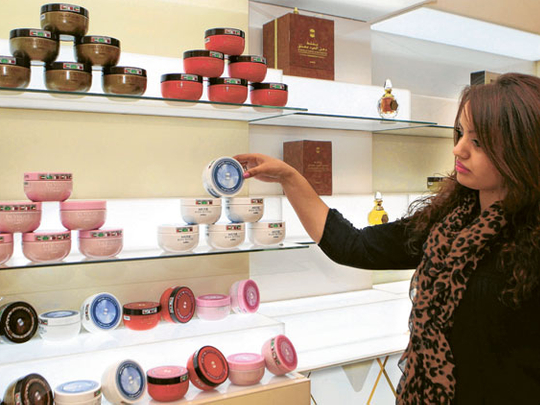
Dubai Ajmal Perfumes has taken to the streets, literally. It has blanketed key thoroughfares in the UAE with outdoor posters — or mupi in ad industry parlance — showcasing the recent entry into body butters.
But for a range that has been available in its stores since October, why go in for a saturation push now?
"Nowadays the concept of launches in our industry is completely different from the early days when there was a song-and-dance about any new introduction," Abdullah Ajmal, general manager, said.
"We place a lot of importance on the initial responses from customers at our shops before getting into a serious marketing push. Acceptance has to be built over a period of time and just by advertising from Day One, it's not going to happen.
Building credibility
"You have to build credibility as this is a new category that we as a perfumery company was getting into."
Now the company believes enough of an acceptance has solidified around the body butter range, so much so that by the third quarter, two more variants will be introduced into the market to add to the existing four.
The acceptance levels also explain why Ajmal Perfumes has taken its product building exercise to the streets. This will be matched by roadshows and reaching out through loyalty programmes.
Given the kind of brand supremacy it enjoys in the local and Gulf markets for its fragrances, why did the company seek a line extension? More so, as the margins in the perfume category are said to be obscenely high.
"What they say about margins is true of the international brands where the factory margins — the coefficient from the cost to sales — are very, very high," Ajmal said. "But in the local perfume industry, I can say that the margins are nowhere near as for the international names. In fact, without fear of contradiction, I can say we are accustomed to working with fairly limited margins.
Capturing attention
"By my reckoning, there were hundreds of fragrance launches in 2011 alone across all categories. The need for an established brand is to try to capture attention and a share of the customer's pocket.
"By introducing body butters, we are basically creating an up-sell proposition, i.e., those who will buy our fragrances will try the new range as well. And over a period of time realise the aesthetic benefits of it.
"We foresee it as an extension of our generic business and an increasingly important category. I don't think it will ever overtake the perfumery side; what we see it is as an extended offering for the Ajmal customer."
The company has had its branded lotions, powders and cream for nearly a decade, and together with the body butters would make up 5-6 per cent of revenues. Where Ajmal Perfumes is concerned, that is a good enough coating to have.
Retail strategies: Diversifying beyond Gulf
Its Far Eastern sojourn is going well for Ajmal Perfumes. The numbers from Malaysia, which it entered in 2010, are looking good and, just as important, it's finding the retail avenues for its distribution there.
Singapore is another market where it is starting to get the numbers right. So much, Abdullah Ajmal, believes by 2015-16, the non-GCC revenues could conceivably start contributing as much as the Gulf operations.
But a move into the Western markets is on hold for obvious reasons. "It would be silly for a new brand to even consider it now," Ajmal said.
In the UAE, the brand is going through a makeover of its retail network to make the switch from "a very ethnic feel to ethnic chic, where the environment is more international," Ajmal said. Two of the stores — in BurJuman and Mirdif City Centre — already sport the new look.
The decision to get into body butters was made over a year ago and the first of these hit the Ajmal Perfumes store shelves in October.
While the company provides inputs on the fragrance mix, the rest of it is outsourced to a supplier. "It's the pattern in this industry and there are people who are quite good at this," Ajmal added.
— M. N.











